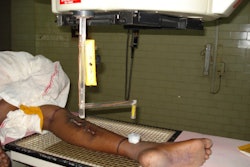BOSTON - Oncologists and referring physicians of patients with brain metastases are overly optimistic when estimating the clinical benefit of palliative whole-brain radiotherapy (WBRT), especially for patients who have a single brain metastasis, according to a poster presentation at the American Society for Therapeutic Radiology and Oncology (ASTRO) meeting.
The physicians, 68% of whom were Canadian oncologists specializing in palliative care, also overestimated the few months of remaining lifetime of their patients by more than 100%.
A research team led by Dr. Elizabeth Barnes mailed a survey to 137 physicians who referred patients with brain metastases to the Rapid Response Radiotherapy Program (RRRP) of Sunnybrook Health Sciences' Odette Cancer Centre in Toronto. The primary objective of the survey was to identify referring physicians' expectations of treatment outcomes for WBRT, as well as to ascertain the accuracy of their estimates of the remaining months of patient survival.
Prior to the arrival of a patient, physicians were faxed a questionnaire that requested information about the patient's disease status, physician demographic data, estimated month of death, and expectations of the benefit that WBRT would provide. Out of the 137 surveys faxed, 79 physicians responded. The actual date of death of each of the 79 patients was obtained from Ontario's cancer registry by RRRP staff.
Although 78.5% of the patients had multiple brain metastases and 60% had extracranial metastases, the median Karnofsky Performance Status (KPS) reported was 70. KPS scores measure the ability of cancer patients to perform ordinary tasks on a scale of 0 to 100, with 100 being optimum.
Expectations of both oncologists and referring physicians were very high. They expected WBRT to improve (77.7%) or stabilize (94.9%) neurological conditions of their patients, improve the quality of life (96.2%), and improve performance status (87%). While only 40% felt that WBRT would extend survival time, the survey respondents were unrealistically optimistic. On average, they predicted that their patients would live an additional six months after treatment, whereas actual survival was a median of 2.5 months.
Lead author Barnes said that the study results illustrate the conundrum faced by many terminal patients -- as well as their caregivers.
"I think that referring physicians want patients to meet and discuss WBRT with a radiation oncologist," she said. "It may be a wasted visit for many patients as they will not benefit from WBRT, but it is very hard at the end of life to admit there are no good treatment options available."
By Cynthia Keen
AuntMinnie.com staff writer
September 23, 2008
Related Reading
Whole-brain radiation does not improve on stereotactic radiation, June 8, 2006
Copyright © 2008 AuntMinnie.com



















